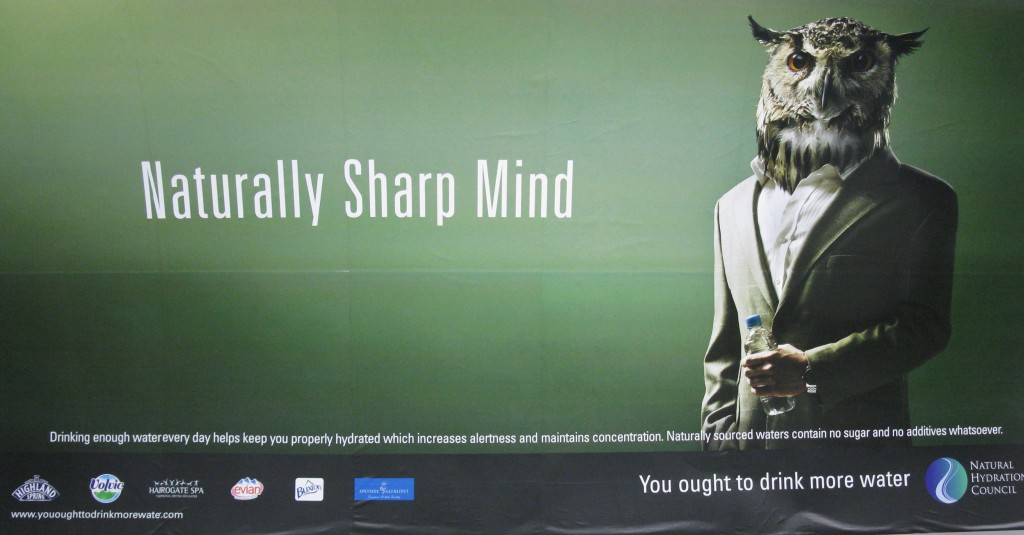
‘You ought to drink more water,’ scold gigantic ads on London’s Underground, a sharp-eyed owl glaring accusingly. ‘Drinking enough water everyday helps keep you properly hydrated which increases alertness and maintains concentration.’ Fail to drink enough water, and you’ll be sluggish and dim-witted, the owl warns.
Fortunately, through this generous public service message, the Natural Hydration Council is here to remind you to drink ‘2 – 3 litres of water a day,’ such as from a clear, shiny plastic bottle of water like the one the owl is clutching.
Who is the Natural Hydration Council? A soothingly nondescript name like that should rouse suspicion, just like the Safe Energy Coalition (funded by the nuclear power industry) or the Foundation for Clean Air Progress (a front for the American Petroleum Institute).
The NHC however is at least honest about its financial backers with a string of logos at the bottom of their ads, including Volvic, Evian and Buxton Springs. The public relations face of the bottled water industry: ‘The Natural Hydration Council is dedicated to researching the science and communicating the facts about naturally sourced bottled water.’
Leaving aside the environmental impacts of bottled water, let’s focus on their main claim: that ‘science’ proves we each require two to three litres of water a day.
Interestingly enough, a review of scientific studies published last year in the Journal of the American Society for Nephrology examined what evidence there is to support the accepted belief that healthy adults should drink eight glasses of eight ounces of water a day and came to the conclusion that: ‘There is no clear evidence of benefit from drinking increased amounts of water.’ So where did the notion that we need to drink two to three litres of water a day come from? ‘Nobody really knows. There is no single study—and therefore no single outcome—that has led to these recommendations.’
Interesting. What is also interesting is that the Natural Hydration Council claims that it ‘was founded in response to growing sales of bottled water and greater public debate over its social and economic impact.’ It is indeed true that the public debates over its impact have grown – though their claim of ‘growing sales’ is not quite as accurate. Research published last year by retail analysts TNS showed sales of bottled water declining, by nine per cent, for the first time in two decades.
But even if solid evidence existed to support the notion that we each need to drink two litres of water a day to stay healthy, what is more likely: that we are all woefully under hydrated in affluent Western cities, requiring the beneficent intervention of the Natural Hydration Council? Or that they are spending millions on a campaign using the pretence of ‘scientific’ evidence to bolster declining sales?